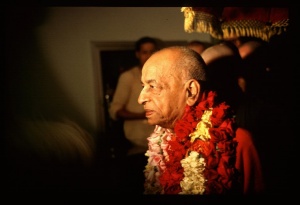SB 10.76.14-15: Difference between revisions
m (1 revision(s)) |
(Vanibot #0054 edit - transform synonyms into clickable links, which search similar occurrences) |
||
| (One intermediate revision by one other user not shown) | |||
| Line 1: | Line 1: | ||
{{info | {{info | ||
|speaker= | |speaker=Śukadeva Gosvāmī | ||
|listener=King | |listener=King Parīkṣit | ||
}} | }} | ||
[[Category:Srimad-Bhagavatam - Canto 10 Chapter 76]] | |||
[[Category:Bhagavatam Verses Spoken by Sukadeva Gosvami - Vanisource|107614]] | |||
<div style="float:left">'''[[Srimad-Bhagavatam]] - [[SB 10|Tenth Canto]] - [[SB 10.76: The Battle Between Salva and the Vrsnis|SB 10.76: The Battle Between Salva and the Vrsnis]]'''</div> | |||
<div style="float:right">[[File:Go-previous.png|link=SB 10.76.13]] '''[[SB 10.76.13]] - [[SB 10.76.16]]''' [[File:Go-next.png|link=SB 10.76.16]]</div> | |||
{{RandomImage}} | |||
{{SBnotice}} | |||
==== TEXTS 14-15 ==== | ==== TEXTS 14-15 ==== | ||
<div | <div class="verse"> | ||
sātyakiś cārudeṣṇaś ca | :sātyakiś cārudeṣṇaś ca | ||
sāmbo 'krūraḥ sahānujaḥ | :sāmbo 'krūraḥ sahānujaḥ | ||
hārdikyo bhānuvindaś ca | :hārdikyo bhānuvindaś ca | ||
gadaś ca śuka-sāraṇau | :gadaś ca śuka-sāraṇau | ||
apare ca maheṣv-āsā | |||
ratha-yūthapa-yūthapāḥ | :apare ca maheṣv-āsā | ||
niryayur daṁśitā guptā | :ratha-yūthapa-yūthapāḥ | ||
rathebhāśva-padātibhiḥ | :niryayur daṁśitā guptā | ||
:rathebhāśva-padātibhiḥ | |||
</div> | </div> | ||
| Line 21: | Line 27: | ||
==== SYNONYMS ==== | ==== SYNONYMS ==== | ||
<div | <div class="synonyms"> | ||
sātyakiḥ cārudeṣṇaḥ | ''[//vanipedia.org/wiki/Special:VaniSearch?s=sātyakiḥ&tab=syno_o&ds=1 sātyakiḥ] [//vanipedia.org/wiki/Special:VaniSearch?s=cārudeṣṇaḥ&tab=syno_o&ds=1 cārudeṣṇaḥ] [//vanipedia.org/wiki/Special:VaniSearch?s=ca&tab=syno_o&ds=1 ca]'' — Sātyaki and Cārudeṣṇa; ''[//vanipedia.org/wiki/Special:VaniSearch?s=sāmbaḥ&tab=syno_o&ds=1 sāmbaḥ]'' — Sāmba; ''[//vanipedia.org/wiki/Special:VaniSearch?s=akrūraḥ&tab=syno_o&ds=1 akrūraḥ]'' — and Akrūra; ''[//vanipedia.org/wiki/Special:VaniSearch?s=saha&tab=syno_o&ds=1 saha]'' — with; ''[//vanipedia.org/wiki/Special:VaniSearch?s=anujaḥ&tab=syno_o&ds=1 anujaḥ]'' — younger brothers; ''[//vanipedia.org/wiki/Special:VaniSearch?s=hārdikyaḥ&tab=syno_o&ds=1 hārdikyaḥ]'' — Hārdikya; ''[//vanipedia.org/wiki/Special:VaniSearch?s=bhānuvindaḥ&tab=syno_o&ds=1 bhānuvindaḥ]'' — Bhānuvinda; ''[//vanipedia.org/wiki/Special:VaniSearch?s=ca&tab=syno_o&ds=1 ca]'' — and; ''[//vanipedia.org/wiki/Special:VaniSearch?s=gadaḥ&tab=syno_o&ds=1 gadaḥ]'' — Gada; ''[//vanipedia.org/wiki/Special:VaniSearch?s=ca&tab=syno_o&ds=1 ca]'' — and; ''[//vanipedia.org/wiki/Special:VaniSearch?s=śuka&tab=syno_o&ds=1 śuka]-[//vanipedia.org/wiki/Special:VaniSearch?s=sāraṇau&tab=syno_o&ds=1 sāraṇau]'' — Śuka and Sāraṇa; ''[//vanipedia.org/wiki/Special:VaniSearch?s=apare&tab=syno_o&ds=1 apare]'' — others; ''[//vanipedia.org/wiki/Special:VaniSearch?s=ca&tab=syno_o&ds=1 ca]'' — also; ''[//vanipedia.org/wiki/Special:VaniSearch?s=mahā&tab=syno_o&ds=1 mahā]'' — eminent; ''[//vanipedia.org/wiki/Special:VaniSearch?s=iṣv&tab=syno_o&ds=1 iṣv]-[//vanipedia.org/wiki/Special:VaniSearch?s=āsāḥ&tab=syno_o&ds=1 āsāḥ]'' — archers; ''[//vanipedia.org/wiki/Special:VaniSearch?s=ratha&tab=syno_o&ds=1 ratha]'' — of chariot (warriors); ''[//vanipedia.org/wiki/Special:VaniSearch?s=yūtha&tab=syno_o&ds=1 yūtha]-[//vanipedia.org/wiki/Special:VaniSearch?s=pa&tab=syno_o&ds=1 pa]'' — of the leaders; ''[//vanipedia.org/wiki/Special:VaniSearch?s=yūtha&tab=syno_o&ds=1 yūtha]-[//vanipedia.org/wiki/Special:VaniSearch?s=pāḥ&tab=syno_o&ds=1 pāḥ]'' — the leaders; ''[//vanipedia.org/wiki/Special:VaniSearch?s=niryayuḥ&tab=syno_o&ds=1 niryayuḥ]'' — they went out; ''[//vanipedia.org/wiki/Special:VaniSearch?s=daṁśitāḥ&tab=syno_o&ds=1 daṁśitāḥ]'' — wearing armor; ''[//vanipedia.org/wiki/Special:VaniSearch?s=guptāḥ&tab=syno_o&ds=1 guptāḥ]'' — protected; ''[//vanipedia.org/wiki/Special:VaniSearch?s=ratha&tab=syno_o&ds=1 ratha]'' — by (soldiers on) chariots; ''[//vanipedia.org/wiki/Special:VaniSearch?s=ibha&tab=syno_o&ds=1 ibha]'' — elephants; ''[//vanipedia.org/wiki/Special:VaniSearch?s=aśva&tab=syno_o&ds=1 aśva]'' — and horses; ''[//vanipedia.org/wiki/Special:VaniSearch?s=padātibhiḥ&tab=syno_o&ds=1 padātibhiḥ]'' — and by foot soldiers. | ||
</div> | </div> | ||
{{SBcollapse}} | |||
==== TRANSLATION ==== | ==== TRANSLATION ==== | ||
<div | <div class="translation"> | ||
The chief commanders of the chariot warriors—Sātyaki, Cārudeṣṇa, Sāmba, Akrūra and his younger brothers, along with Hārdikya, Bhānuvinda, Gada, Śuka and Sāraṇa—went out of the city with many other eminent bowmen, all girded in armor and protected by contingents of soldiers riding on chariots, elephants and horses, and also by companies of infantry. | The chief commanders of the chariot warriors—Sātyaki, Cārudeṣṇa, Sāmba, Akrūra and his younger brothers, along with Hārdikya, Bhānuvinda, Gada, Śuka and Sāraṇa—went out of the city with many other eminent bowmen, all girded in armor and protected by contingents of soldiers riding on chariots, elephants and horses, and also by companies of infantry. | ||
</div> | </div> | ||
__NOTOC__ | </div> | ||
</div> | |||
<div style="float:right">[[File:Go-previous.png|link=SB 10.76.13]] '''[[SB 10.76.13]] - [[SB 10.76.16]]''' [[File:Go-next.png|link=SB 10.76.16]]</div> | |||
__NOTOC__ | |||
__NOEDITSECTION__ | |||
Latest revision as of 19:55, 17 February 2024

A.C. Bhaktivedanta Swami Prabhupada
Please note: The synonyms, translation and purport of this verse were composed by disciples of Śrīla Prabhupāda
TEXTS 14-15
- sātyakiś cārudeṣṇaś ca
- sāmbo 'krūraḥ sahānujaḥ
- hārdikyo bhānuvindaś ca
- gadaś ca śuka-sāraṇau
- apare ca maheṣv-āsā
- ratha-yūthapa-yūthapāḥ
- niryayur daṁśitā guptā
- rathebhāśva-padātibhiḥ
SYNONYMS
sātyakiḥ cārudeṣṇaḥ ca — Sātyaki and Cārudeṣṇa; sāmbaḥ — Sāmba; akrūraḥ — and Akrūra; saha — with; anujaḥ — younger brothers; hārdikyaḥ — Hārdikya; bhānuvindaḥ — Bhānuvinda; ca — and; gadaḥ — Gada; ca — and; śuka-sāraṇau — Śuka and Sāraṇa; apare — others; ca — also; mahā — eminent; iṣv-āsāḥ — archers; ratha — of chariot (warriors); yūtha-pa — of the leaders; yūtha-pāḥ — the leaders; niryayuḥ — they went out; daṁśitāḥ — wearing armor; guptāḥ — protected; ratha — by (soldiers on) chariots; ibha — elephants; aśva — and horses; padātibhiḥ — and by foot soldiers.
Translation and purport composed by disciples of Śrīla Prabhupāda
TRANSLATION
The chief commanders of the chariot warriors—Sātyaki, Cārudeṣṇa, Sāmba, Akrūra and his younger brothers, along with Hārdikya, Bhānuvinda, Gada, Śuka and Sāraṇa—went out of the city with many other eminent bowmen, all girded in armor and protected by contingents of soldiers riding on chariots, elephants and horses, and also by companies of infantry.